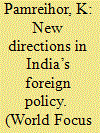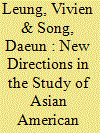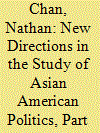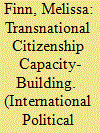|
|
|
Sort Order |
|
|
|
Items / Page
|
|
|
|
|
|
|
| Srl | Item |
| 1 |
ID:
142143


|
|
|
|
|
| Summary/Abstract |
India aspires to be a global power and it certainly has that capability. However, primary challenges lie in the domestic fields of activities; the issues of governance and the pressing problem of corruption, badly undermining India’s core strategy of inclusive growth. The poor state of governance leaves it vulnerable to cross-border problems, to address these domestic issues; India needs to reinforce the righteous circle that is inherent in its liberal and democratic structures and traditions. In fact, addressing issue of policing will be vital to the all-embracing effort to achieve better governance and security. If India does not carry out the governance reforms, it is likely China will continue to command economically and militarily in this century. (Gordon 2015) understands that in order to fully realise its potential and emerge as a truly global power, India has first to neutralise threats originating in South Asian by concentrating on the domestic and neighbourhood sphere of activity. Its goal to be a global player would be realised not necessarily in terms of military assets, but more in terms of other global skill such as possessing vigorous globally connected financial, commercial, industrial, research and educational sectors and developing as trading and investment partners with the quality of rule of law that is needed to play a genuine global economic role. In fact, domestic political stability, peace and equitable economic growth of all sections of society is a sine qua non for India to achieve its goal of emerging as a major power. Since the launch of economic reformsin 1990s, India has been growing persistently. The shift from Non-Alignment to multi-alignment is a national policy; over the last decades India has built up its political, economic and strategic relations with practically every major country. For India to be one key player, it needs to maintain its ethos, culture, heritage and longing for world peace. In fact, it is because of this legacy that India’s emerging today is to seen with no suspicion and fear.
|
|
|
|
|
|
|
|
|
|
|
|
|
|
|
|
| 2 |
ID:
146590


|
|
|
| 3 |
ID:
179422


|
|
|
| 4 |
ID:
179423


|
|
|
| 5 |
ID:
161365


|
|
|
|
|
| Summary/Abstract |
Challenging statist understandings of citizenship neglectful of their own ironies, we explore the literature on circulation to argue that political actors build citizenship capacities through the transfer of various technologies, ideas, and modes of organization and by enhancing self-understanding across and within borders. This work is largely conceptual. Although we focus on transnational activist engagement with and within the Middle East, the theoretical linkages we make here can be extended to other social and political actors that operate within and across multiple geographical locales. To make our case, we briefly examine the importance of transnational circulation for citizenship capacity-building through a review of the relevant literature and then discuss how theories related to liminality and rhizomatic action can move the theoretical discussion in new directions. Our central argument is that the circular flow of people, political ideas, and tools across nation-state borders—including activists’ affinities, identifications, loyalties, animosities, and hostilities—are transforming contemporary social and political relations, including how people see themselves as citizens and build civic capacities in others. Political actors who act purposefully in various sites and scales of struggle are transforming how political subjectivity and citizenship are negotiated, claimed, justified, and legitimated regardless of citizenship status.
|
|
|
|
|
|
|
|
|
|
|
|
|
|
|
|
|
|
|
|
|